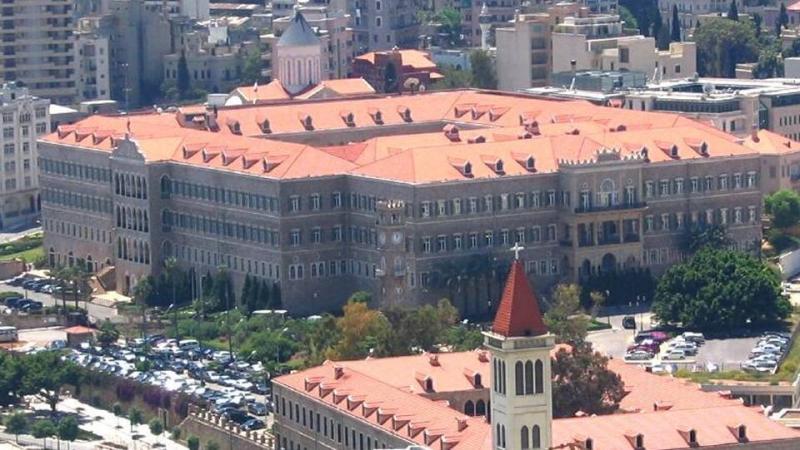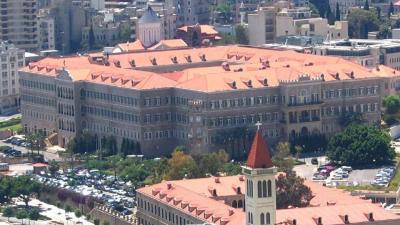This week, more indicators are expected to emerge regarding the mission of the American mediator Amos Hochstein in demarcating maritime borders, as Lebanon awaits a final Israeli response concerning its borders and rights in order to act accordingly. Meanwhile, a political dispute appears to be looming over the presidential elections, which may hinder the achievement of this process within the constitutional time limit. This has reignited discussions about the necessity of forming a new government to assume the powers of the President after the end of his term, especially since some circles are revisiting the constitutionality of a caretaker government holding these powers amid a potential vacancy in the presidency and the difficulties of forming a fully qualified government.
Official activities have been absent due to the Prime Minister-designate and caretaker Prime Minister Najib Mikati being on vacation abroad, and no communication has been recorded between him and President Michel Aoun since their last meeting, which coincided with the army's celebrations and the American mediator's visit during the recent maritime border negotiations with Beirut. Their relationship remains limited to daily correspondence between the Secretary General of the Cabinet and the Directorate General of the Presidency.
Informed political circles believe that "it is a mistake and a danger to surrender to the idea that a new government cannot be formed, based on the premise that the upcoming presidential elections render it 'unnecessary'." These circles stated to "Al-Joumhouria" that "the importance of forming a new government is not measured by the time remaining until the presidential elections, but is associated with the possibility of failing to elect a president within the constitutional timeframe, which is a significant risk that necessitates the existence of a fully qualified government to manage the country during the transitional period. The country's situation cannot bear being without a president and a genuine government for months while relying on a caretaker government with limited powers."
The same circles asserted that "Prime Minister Najib Mikati would be the first to suffer from failing to put in the necessary effort to form a government, as this stance would shift him from being a specialist in navigating through challenges to being positioned in a sharp corner, contrary to his political career, which could lead to the loss of one of his most important traits that kept him within the circle of candidates for the premiership."
They further indicated that "it is inaccurate to claim that a presidential vacuum would allow Mikati to act as a de facto ruler as the head of a caretaker government, as each minister would become a decision maker in the event of a vacancy, thus being able to obstruct any decision they find unsuitable."
Meanwhile, opposing political circles told "Al-Joumhouria" that certain political forces within the country and some decision-making circles abroad are promoting the theory that the current suffering of the Lebanese people is due to the new, unprecedented acute financial crisis, and that failing to address this crisis promptly will exacerbate it. They pointed out that the political division is neither new nor recent, and addressing it remains impossible. For many, what is chiefly required is to restore the Lebanese situation to what it was before the financial collapse, which is indeed possible, meaning that addressing the financial crisis is achievable, unlike the political crisis, which is insurmountable.
They argued that the starting point for this rescue begins with electing a president with a financial rather than a political focus, who can concentrate on financial issues instead of the political matters that are unsolvable. This would involve negotiations with the International Monetary Fund, enacting reform laws, and other relevant steps.
These circles expressed concern regarding this approach, as it could be promoted under the guise of preserving stability and preventing a power vacuum while focusing on tackling the financial crisis. Through this type of approach, the ruling team maintains its grip on power, despite the foundational causes of the financial collapse being fundamentally political, resulting from the absence of a state, the plundering of its resources, and the burden of a statelet that opens borders for smuggling and isolates Lebanon from its surroundings, as well as the corruption of a political class that benefits from the state's absence.
They recalled the experience of the late President Rafik Hariri, who was subjected to a similar dividing line between political and security issues, which were under the jurisdiction of the Lebanese-Syrian security apparatus, and economic, financial, and developmental issues which were his purview. Ultimately, this resulted in his assassination, warning that any president who distances himself from political issues will meet the same fate when he decides to address them and take appropriate stances. They insisted that addressing the crisis through a financial lens without considering the political side is entirely misguided.
The same circles confirmed, "The financial crisis is a natural consequence of the political crisis, and it is impossible to address this financial crisis without addressing its political causes. The collapse the country has reached was expected and inevitable; had there been a way out, the ruling team currently in power would have been capable of extricating itself, given its absolute control over state mechanisms. Aside from the fact that reform contradicts this team's nature, experience has shown that the collapse resulted from the disappearance of the state, and the way out begins with restoring this state's role."
They emphasized, "The idea of avoiding a vacuum to prevent collapse is no longer valid after the country has slipped into a collapse worse than before, where there is no difference between a vacuum and merely filling it superficially without any change in the current state of the crisis. Therefore, there must be insistence on electing a president who embodies both sovereignty and reform to set the country on the path to recovery, as well as insistence on excluding both the March 8 and centrist presidents to focus on the financial crisis. Otherwise, they will merely provide cover for 'Hezbollah,' and the financial crisis will persist, as recovery begins with the political door, not the financial one, and specifically with the sovereignty aspect."




